Occupational Therapy Month
To close off the month, we are shining a light on members of the McGill University Health Centre’s team of occupational therapists. This dynamic team cares for patients from all clinics and units of the hospital from the MGH Hand Clinic, to the ICUs and anxiety clinic. Their patients’ success is their success and seeing patients return to the activities of their daily lives, is what drives them to be the best at what they do.
“During the pandemic, the Occupational Therapy Department adapted in many ways including supporting the COVID unit and providing rehabilitation to these vulnerable patients, support newly created MUHC areas like the MGH test centre, adapt the way in which we provided outpatient care with tele-rehabilitation, and adjust the way in which we provided clinical education to students,” says Kashif Baig , Manager, Occupational Therapy, MUHC.
For OT month, we shine a light on four OTs with different specialties, but who are united by their dedication to helping their patients improve the quality of their daily lives.
Judy Lamb
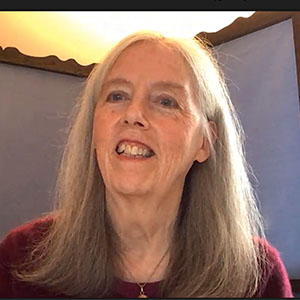
Judy Lamb has been an Occupational Therapist for 45 years. She came out of retirement during the pandemic to work remotely with patients from the MUHC anxiety clinic. As an OT specialized in anxiety, she helps patients solve problems so that they can achieve their goals, anything from moving to a new apartment to finding work or meaningful leisure activities.
“The role of an occupational therapist when working with patients who have anxiety is similar to working with patients who have physical limitations, which is to function despite existing external barriers,” explains Judy. What she especially likes about being an OT in the anxiety clinic is the holistic approach taken, “We look at the whole person and figure out what is in the way of them achieving their goals and piece-by-piece we figure out how we are going to get there.” Judy feels a great sense of satisfaction when her patients succeed and gain a sense of hope for their futures.
Kelly Epstein
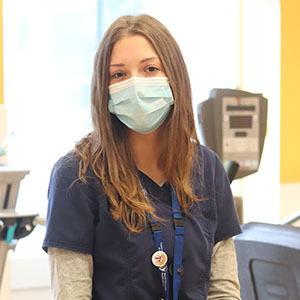
Working in the Emergency Department as an occupational therapist, Kelly Epstein ensures patients are functionally able to go home upon discharge. “I assess whether the patient can function on their own, that they have not deconditioned to the point where, for example, they cannot walk or dress themselves,” she says. If a patient has lost some functions, Kelly will arrange for the patient to receive support from CLSCs or outpatient rehabs and day hospitals so that they can go home rather than spend another night in the emergency.
“A day in bed for an older adult can lead to significant deconditioning, so the sooner we see a patient, the less likely they will decondition in the hospital and the quicker we can get them the support they need at home,” she explains.
Kelly has always loved working with the elderly and it was in doing a student stage at the MUHC that she realized the ED environment was a good fit for her. She likes the patient population, the pace and the fact that each day is different. She has been working at the MUHC for three years and is now the student coordinator for the OT stages, linking OT students up with mentors in hopes that they too will find their perfect fit. Kelly needed to adapt the clinical teaching program to the new realities of working inside the MUHC ensuring the proper checks pre stage, the proper education on PPE’s and hand hygiene, as well as adjusting to the changing unit landscape when outbreaks or staff exposure would occur effecting a student’s stage.
Kelly Race
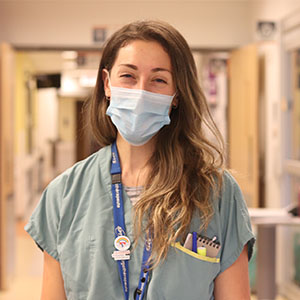
As an occupational therapist on the respiratory ICU and unit at the Royal Victoria Hospital, Kelly Race likes that her days are unpredictable, fast paced, and devoted to patient-centered care. She works with a wide variety of respiratory patients, including patients who are working to come off of breathing machines. Her focus is on helping them to regain their autonomy in everyday tasks like swallowing, self-feeding and perform grooming tasks.
“We take it step by step. We work on rehabilitating patients by teaching them how to pace their breathing within an activity, moving themselves from one surface to another, providing energy conservation techniques, and encouraging them to perform small tasks such as stacking blocks, to work on strength and endurance” says Kelly.
A memorable experience for Kelly was when she worked with a young patient who had a prolonged ICU stay. After several months of working with the multi-disciplinary team, he was discharged to a rehabilitation center. A few months later, he returned to the unit to thank his care team, giving Kelly great satisfaction knowing the impact she can have on patients.
“When I met him, he was not able to move out of his hospital bed on his own. It was such a pleasure to see him walk on to the unit on his own,” she says. Seeing patients improve and regain their functional autonomy is the ultimate goal, and the motivating factor for being an OT.
Kelly continues to also support the COVID unit, as needed, depending on the fluctuating volumes and staffing needs.
Isabel Hrapkowicz
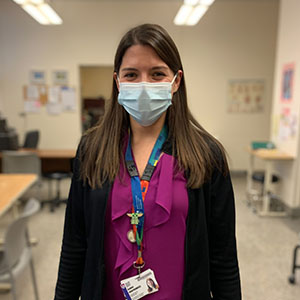
Working at a tertiary and quaternary care hospital, Isabelle Hrapkowicz gets to work with patients who have very specific needs. She is an occupation therapist specializing in hand therapy at the MGH hand centre where the majority of her patients have undergone complex surgery after experiencing trauma to their hands.
She works with patients so that they can regain functional use of their hand and return to their activities of daily living. The complexity of her patients’ needs means she follows guidelines and protocols that involve specific exercises and fabricating tailored orthoses.
“The challenge of seeing various diagnoses is stimulating and requires me to get creative. I work closely with the surgeons and my peers to ensure patients successfully regain hand mobility,” she says.
Isabel is the junior therapist at the hand centre for only two years and relied on her more experienced colleagues to help her through the learning curve. “My colleagues motivate me to be a better therapist and when a patient improves, it is very rewarding. A patient’s success is also my success!”
On different occasions, Isabel volunteered to cover the MGH Test Centre, the RVH COVID unit and was re-assigned to the MGH inpatient unit to fill in for colleagues.
To thank the MUHC Occupational Therapists, Kashif organized a virtual lunch for all of the MUHC adult site OTs. Also in attendance were Martine Alfonso, Associate President and Executive Director, MUHC and Colleen Timm, Director, Multidisciplinary Services, adult sites (DSM), Mental Health Mission, and responsible for the NSA/SAPA patient trajectory, who underlined the importance of team work and facing adversity with resilience, all of which the MUHC occupational therapists have done over the last year-and-a-half. Throughout the pandemic, OTs were amongst those asked to put aside their normal activities to help manage the crisis. They had to fill in for colleagues who were personally affected by the virus and were reassigned to the COVID-19 testing centres and onto the COVID-19 units as the need for rehabilitation increased.
Here are some images from the virtual celebration.
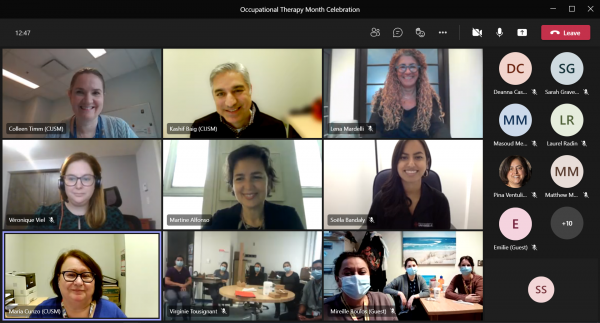
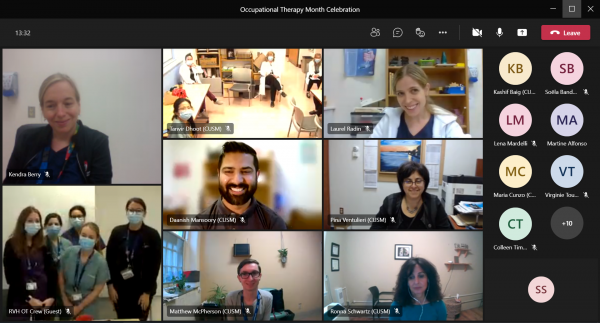
To join the MUHC, and become a part of a great team like this, visit: muhc.ca/careers
